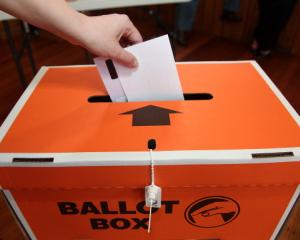The general election last year was the only one in our history to be conducted under the mysterious fog of the Electoral Finance Act, a piece of legislation brought in by the Clark government at the behest of the Green Party as an exercise in forcing disclosure of funding sources, and in hope of nobbling political opponents, but which no-one - least of all its architects - fully understood.
Nor did those charged with interpreting its requirements, with a number of auditors' reports on party returns noting "current uncertainty" about some of its provisions.
The Act has since been repealed, in fulfilment of the National Party's commitment, and all parties represented in Parliament are said to be working towards what they hope will be an acceptable replacement.
If this sounds a little like inviting the fox to redesign the henhouse, with provision to leave the door slightly ajar, then politicians have only themselves to blame for the public's scepticism.
It is noteworthy how some of the parties managed last year's campaign under the EFA's onerous provisions.
According to the official returns, National spent $2.21 million (and was successful in forming a government); Labour spent more, $2.26m (but lost power); the Green Party $1.46m (winning 9 seats but is not in the coalition); Act New Zealand spent $1.14m (and won five seats and is in the coalition); the Maori Party spent a mere $222,000 (but won five seats, and some might argue holds the most powerful minority influence in the Government); the Progressive Party spent $168,000 (and returned Jim Anderton to the Opposition benches); and United Future $152,000 (and returned Peter Dunne to ministerial office as a member of the coalition).
Did the EFA's limitations influence this level of spending? Clearly they did, on the admission of some of the parties, but did that affect the outcome of the poll? The question is moot.
The Greens doubled their 2005 spending for two more list MPs, but were still well under their legal limit.
Both National and Labour remained under their spending limits, but only just.
In fact, none of the parties exceeded the limits imposed by the regulations and so did not risk having expenditure marked as illegal election expenses, as was the case in 2005.
Can we believe these figures? Of course not.
The distance between what the major parties spent on their election campaigns and what they listed in their donations returns is so great as to suggest sufficient loopholes still existed to legally exploit.
As to accusations of party donors "buying" influence, no study of the returns will necessarily assist in disproving or reinforcing anyone's conspiracy theory.
Big business owners and wealthy individuals gave large sums to National and Act, but they also gave similar sums to New Zealand First; wealthy individuals contributed to Labour's campaign, as did several trade unions.
It is relevant to note the comments of the Labour Party's secretary that donations from the corporate sector are declining, while wealthy individuals "with a particular political point of view" were contributing to both major parties.
The EFA also supposedly prevented secret trusts from making large donations without declaring the source, but herein lies a conundrum: there was nothing to prevent one entity making many donations which were under the $10,000 disclosure barrier.
The need for transparency is the one aspect of the EFA which must be retained when the cross-party committee eventually reaches its recommendations.
That means all donors to parties should be named, and that what constitutes electoral advertising is clearly defined, including publicity by a government in office during an electoral campaign.
The new legislation must also take account of 21st-century mechanisms, including how parties may use the internet for advertising purposes.
Consideration needs also to be given to clarifying the position of individuals or groups who, although not organised or registered as political parties, nevertheless wish to contribute to campaigns - what might be termed the "Exclusive Brethren" clause.
There are very many good reasons why, in a democracy, such people and groups should be able to do so, but the rules for them need to also have funding limits, and require transparency.
Disclosure should act as a clear and steady democratic light on the subject of electoral support.
Secrecy is probably the preferred route of parties and many donors, but as the experience of the last election campaign showed, an apparent requirement for openness did not prevent parties from campaigning at a level similar to previous campaigns.
If full disclosure represents a threat to political influence, then that is all the reason needed to require it.











